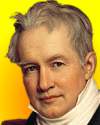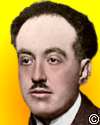 | TODAY IN SCIENCE HISTORY NEWSLETTER - 19 MARCH |
| Feature for Today |
 On 19 Mar 1800, Alexander von Humoldt was on a five-year expedition in the jungles of South America and captured specimen animals from the Calabozo swamps. (See the quiz below) On 19 Mar 1800, Alexander von Humoldt was on a five-year expedition in the jungles of South America and captured specimen animals from the Calabozo swamps. (See the quiz below)It was with the help of the local Indians that Humboldt collected his specimens of this interesting animal with a defense mechanism that killed horses. He wrote extensively on his experiments on these animals. A shorter account is given in Lives of the Brothers Humboldt (1852), and you can read some of the startling details of the collection method, in which two horses died, here. |
| Book of the Day | |
| |
| Quotations for Today | |
 | "Vulnerable, like all men, to the temptations of arrogance, of which intellectual pride is the worst, he [the scientist] must nevertheless remain sincere and modest, if only because his studies constantly bring home to him that, compared with the gigantic aims of science, his own contribution, no matter how important, is only a drop in the ocean of truth." |
 | "..the planet is just too small for these developing countries to repeat the economic growth in the same way that the rich countries have done it in the past. We don't have enough natural resources, we don't have enough atmosphere. Clearly, something has to change," - Mario Molina, Mexican-American chemist (died 18 Mar 1943) |
 | "I have always attached great importance to the manner in which an experiment is set up and conducted ... the experiment should be set up to open as many windows as possible on the unforeseen." |
| QUIZ | |
| Before you look at today's web page, see if you can answer some of these questions about the events that happened on this day. Some of the names are very familiar. Others will likely stump you. Tickle your curiosity with these questions, then check your answers on today's web page. | |
| Births | |
 |  On 19 Mar 1900, a French physical chemist was born who was jointly awarded the 1935 Nobel Prize for Chemistry with his wife, who was the daughter of another married couple that were earlier Nobel Prize winners. On 19 Mar 1900, a French physical chemist was born who was jointly awarded the 1935 Nobel Prize for Chemistry with his wife, who was the daughter of another married couple that were earlier Nobel Prize winners.  Can you name this scientist? Also, for what accomplishment was he and his wife awarded the 1935 Nobel Prize? Can you name this scientist? Also, for what accomplishment was he and his wife awarded the 1935 Nobel Prize? |
| Deaths | |
 |  A French physicist (1892-1987) was awarded the 1929 Nobel Prize for Physics for his discovery of the wave nature of electrons. It was in his PhD thesis (1923) that he identified this property of matter should be regarded as similar to the way in which light can be seen to behave with both particle (photoelectric effect) and wave properties (diffraction). A French physicist (1892-1987) was awarded the 1929 Nobel Prize for Physics for his discovery of the wave nature of electrons. It was in his PhD thesis (1923) that he identified this property of matter should be regarded as similar to the way in which light can be seen to behave with both particle (photoelectric effect) and wave properties (diffraction). Can you name this physicist? Can you name this physicist? |
| Events | |
 |  On 19 Mar 1958, Britain's first planetarium, one of the world's largest, was opened in a wing of another established attraction on London. On 19 Mar 1958, Britain's first planetarium, one of the world's largest, was opened in a wing of another established attraction on London.  What was the attraction that opened London's first planetarium? What was the attraction that opened London's first planetarium? |
 |  On 19 Mar 1956, a rocket-powered rail-mounted sled reached a speed of 421 mph carrying John Paul Stapp at Holloman Air Force Base, New Mexico. By year's end, tests increased speed to 632 mph. Yet, the purpose was not the pursuit of any speed record. On 19 Mar 1956, a rocket-powered rail-mounted sled reached a speed of 421 mph carrying John Paul Stapp at Holloman Air Force Base, New Mexico. By year's end, tests increased speed to 632 mph. Yet, the purpose was not the pursuit of any speed record. What was the purpose of Stapp's test? What was the purpose of Stapp's test? |
 |  On 19 Mar 1800, Alexander von Humoldt was on a five-year expedition in the jungles of South America and captured specimen animals at the Calabozo swamps. During his investigation of them, he experienced their defense mechanism, and the result was a severe lack of feeling in his joints for the better part of a day. He was fortunate, because the same experience had been known to kill horses. On 19 Mar 1800, Alexander von Humoldt was on a five-year expedition in the jungles of South America and captured specimen animals at the Calabozo swamps. During his investigation of them, he experienced their defense mechanism, and the result was a severe lack of feeling in his joints for the better part of a day. He was fortunate, because the same experience had been known to kill horses.  What were the animals he discovered there? What were the animals he discovered there? |
| Answers |
When you have your answers ready to all the questions above, you'll find all the information to check them, and more, on the March 19 web page of Today in Science History. Or, try this link first for just the brief answers. Fast answers for the previous newsletter for March 18: dead in sea on a voyage, believed likely suicide from depression, murder not ruled out; cybernetics; Adolph Bandelier; pigs; ceramic; tethered space-walk. |
| Feedback |
 If you enjoy this newsletter, the website, or wish to offer encouragement or ideas, please send feedback by using your mail reader Reply button. If you enjoy this newsletter, the website, or wish to offer encouragement or ideas, please send feedback by using your mail reader Reply button. |
--
If you do not want to receive any more newsletters, Unsubscribe
To update your preferences and to unsubscribe visit this link


Δεν υπάρχουν σχόλια:
Δημοσίευση σχολίου